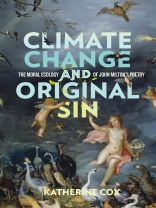Prior to the Enlightenment era, how was the human-climate relationship conceived? Focusing on the most recent epoch in which belief in an animate environment still widely prevailed, Climate Change and Original Sin argues that an ecologically inflected moral system assumed that humanity bore responsibility for climate corruption and volatility.
The environmental problem initiated by original sin is not only that humans alienated themselves from nature but also that satanic powers invaded the world and corrupted its elements—particularly the air. Milton shared with contemporaries the widespread view that storms and earthquakes represented the work of fearsome spiritual agents licensed to inflict misery on humans as penalty for sin. Katherine Cox’s work discerns in Paradise Lost an ecological fall distinct from, yet concurrent with, the human fall. In examining Milton’s evolving representations of the climate, this book also traces the gradual development of ideas about the atmosphere during the seventeenth century—a change in the intellectual climate driven by experimental activity and heralding an ecologically devastating shift in Western attitudes toward the air.
İçerik tablosu
List of Illustrations
Acknowledgments
Introduction
1. ‘Infant Cries’: Meteorological Voices in The Nativity Ode
2. Early Acoustic Theory and the Aural Soul in Comus
3. The Power of the Air in Milton’s Epic Poetry
4. ‘How cam’st thou speakable of mute’: Satanic Acoustics in Paradise Lost
5. Milton and the Barometer: Climate Change in Pneumatic Science
6. ‘Throttled at length in the Air’: Environmental Warfare and Climate Regained
Epilogue
Bibliography
Yazar hakkında
Katherine Cox is an independent scholar living in France.












